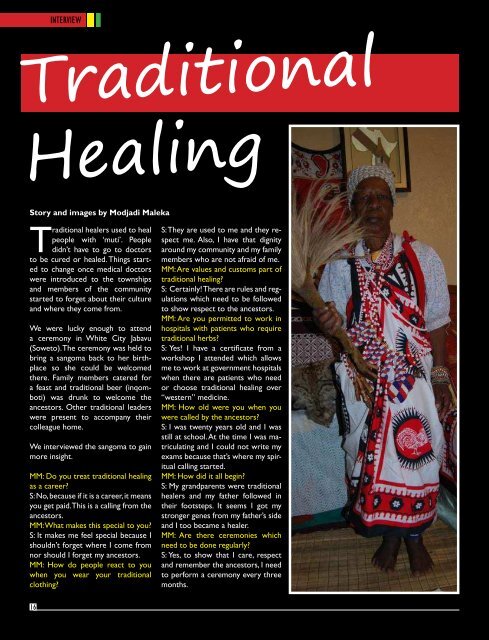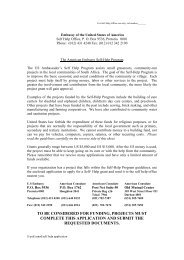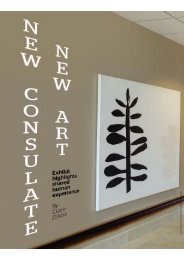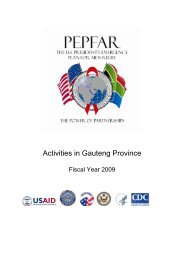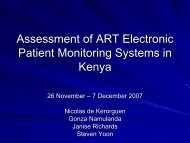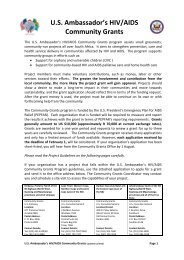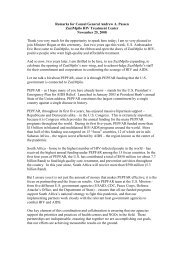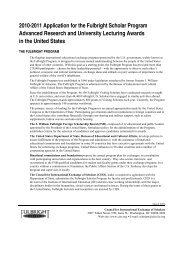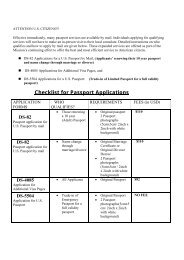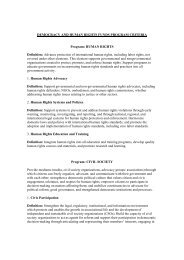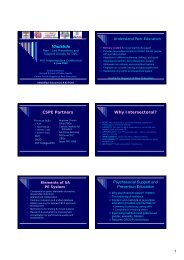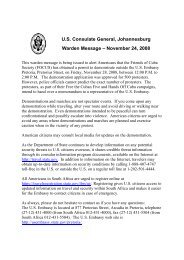Entire Journal (PDF 5.9MB) - South Africa
Entire Journal (PDF 5.9MB) - South Africa
Entire Journal (PDF 5.9MB) - South Africa
Create successful ePaper yourself
Turn your PDF publications into a flip-book with our unique Google optimized e-Paper software.
INTERVIEW<br />
GLOBAL ISSUES<br />
Traditional<br />
Healing<br />
Story and images by Modjadi Maleka<br />
Traditional healers used to heal<br />
people with ‘muti’. People<br />
didn’t have to go to doctors<br />
to be cured or healed. Things started<br />
to change once medical doctors<br />
were introduced to the townships<br />
and members of the community<br />
started to forget about their culture<br />
and where they come from.<br />
We were lucky enough to attend<br />
a ceremony in White City Jabavu<br />
(Soweto). The ceremony was held to<br />
bring a sangoma back to her birthplace<br />
so she could be welcomed<br />
there. Family members catered for<br />
a feast and traditional beer (inqomboti)<br />
was drunk to welcome the<br />
ancestors. Other traditional leaders<br />
were present to accompany their<br />
colleague home.<br />
We interviewed the sangoma to gain<br />
more insight.<br />
MM: Do you treat traditional healing<br />
as a career?<br />
S: No, because if it is a career, it means<br />
you get paid. This is a calling from the<br />
ancestors.<br />
MM: What makes this special to you?<br />
S: It makes me feel special because I<br />
shouldn’t forget where I come from<br />
nor should I forget my ancestors.<br />
MM: How do people react to you<br />
when you wear your traditional<br />
clothing?<br />
S: They are used to me and they respect<br />
me. Also, I have that dignity<br />
around my community and my family<br />
members who are not afraid of me.<br />
MM: Are values and customs part of<br />
traditional healing?<br />
S: Certainly! There are rules and regulations<br />
which need to be followed<br />
to show respect to the ancestors.<br />
MM: Are you permitted to work in<br />
hospitals with patients who require<br />
traditional herbs?<br />
S: Yes! I have a certificate from a<br />
workshop I attended which allows<br />
me to work at government hospitals<br />
when there are patients who need<br />
or choose traditional healing over<br />
“western” medicine.<br />
MM: How old were you when you<br />
were called by the ancestors?<br />
S: I was twenty years old and I was<br />
still at school. At the time I was matriculating<br />
and I could not write my<br />
exams because that’s where my spiritual<br />
calling started.<br />
MM: How did it all begin?<br />
S: My grandparents were traditional<br />
healers and my father followed in<br />
their footsteps. It seems I got my<br />
stronger genes from my father’s side<br />
and I too became a healer.<br />
MM: Are there ceremonies which<br />
need to be done regularly?<br />
S: Yes, to show that I care, respect<br />
and remember the ancestors, I need<br />
to perform a ceremony every three<br />
months.<br />
Rural people still believe in sangomas because<br />
they say it reminds them of their<br />
loved ones who have passed on and<br />
should not be forgotten because they are<br />
not dead; they are simply asleep.<br />
<strong>South</strong> <strong>Africa</strong>ns seem to have forgotten<br />
about their ancestors; they don’t even<br />
perform the small ceremonies required<br />
to show that they remember the ancestors.<br />
Bones are used to instruct a sangoma or<br />
to tell her what is going to happen in the<br />
future. People used to trust the bones<br />
and now that has changed because people<br />
have put their belief in medical doctors.<br />
When the bones have spoken, nothing<br />
should be negotiated or discussed about<br />
what they have said. Rural people still<br />
believe in what the bones say and don’t<br />
question them because that implies that<br />
you are questioning your ancestors. It is<br />
also as if you are discouraging your ancestors<br />
from communicating with you<br />
because that is their only way.<br />
Things have changed; people hardly even<br />
visit their loved ones’ graves to talk, clean<br />
or even introduce their children to these<br />
ancestors who are not dead but merely<br />
asleep. Maybe it’s time we rethink this and<br />
return to our cultural roots...<br />
16 17


